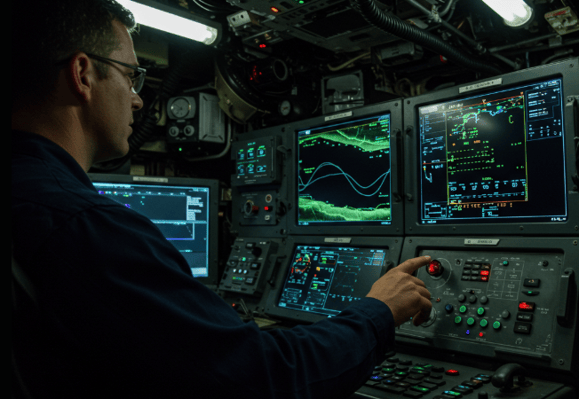
Lockheed Martin’s recent $114 million contract for advanced SONAR systems marks another milestone in the U.S. military's modernization drive. As Elon Musk and the DOGE team review Pentagon spending, this deal raises a compelling question: How will technological innovation and fiscal scrutiny reshape America's defense capabilities in the years ahead?
Overview of Lockheed Martin
Lockheed Martin Corporation (NYSE: LMT) is a global leader in aerospace, defense, and security headquartered in Bethesda, Maryland. Founded in 1995 through the merger of Lockheed Corporation and Martin Marietta, the company has a storied history of innovation in aviation, space exploration, and advanced defense systems.
The innovative company is renowned for iconic aircraft like the F-35 Lightning II, cutting-edge missile defense systems, and sophisticated space technologies. The company maintains a long-standing partnership with the U.S. military, particularly the Navy, providing advanced sonar, radar, and communication systems for maritime defense.
With operations spanning 50+ countries, Lockheed Martin reported $66 billion in 2023 revenue.
What is NAVSEA?

The Naval Sea Systems Command (NAVSEA) is the largest of the U.S. Navy's five systems commands. It’s largely responsible for designing, constructing, maintaining, and modernising the Navy's fleet and combat systems.
NAVSEA was established in 1974 through a consolidation of various naval commands and is currently headquartered in Washington, D.C. Today, it oversees a diverse portfolio, including aircraft carriers, submarines, surface combatants, and advanced systems like SONAR and radar technologies.
NAVSEA also manages over 150 acquisition programs and partners closely with defense contractors like Lockheed Martin to equip the Navy with mission-critical capabilities. Its work ensures that the U.S. Navy remains the world’s most technologically advanced maritime force.
Everything You Need to Know About Lockheed’s Contract
Lockheed Martin secured a $114,162,885 cost-plus-incentive-fee contract modification from the U.S. Navy, overseen by NAVSEA. The funds will support the procurement of advanced hardware for the Navy's sound navigation and ranging (SONAR) systems, which are critical for underwater detection, navigation, and communication.
The contract, initially awarded under Contract N00024-20-C-6117, will finance hardware production and integration. Work is expected to continue until May 2031.
Work location distribution:
- Manassas, Virginia: 65%
- Clearwater, Florida: 32%
- Syracuse, New York: 2%
- Marion, Florida: 1%
The project is financed through:
- Fiscal Year 2025 Other Procurement (Navy): $73.5M (64%)
- Fiscal Year 2025 Shipbuilding & Conversion (Navy): $40.6M (36%)
Another Step in the Overhaul of the US Military
The recent contract awarded to Lockheed Martin is the latest in a series of high-value investments by the U.S. military to modernize its capabilities across land, sea, and air. This focus on innovation reflects a broader, multi-branch effort to maintain technological superiority in an increasingly complex global defense landscape.
In the Air Force domain, General Atomics-Aeronautical Systems Inc. was recently granted a $26.6 million contract modification to support the UK Royal Air Force’s MQ-9 Reaper logistics. The contract, awarded on February 6, 2025, highlights the Air Force's ongoing commitment to enhancing its unmanned aerial capabilities for reconnaissance and combat operations.
Similarly, the Department of Defense's Information Technology infrastructure will benefit from an $8.2 million contract with Analytic Services Inc. The deal, which covers cybersecurity and enterprise IT support, aligns with the Pentagon's mission to bolster digital resilience and operational efficiency.
In addition to these projects, the Defense Logistics Agency has awarded DGCI Corp. a $397.7 million contract for contractor-operated fuel storage services. This illustrates the military’s recognition of the importance of robust logistical operations in promoting force readiness.
Trump Administration's Military Modernization Goals for 2025

These major investments align with the Trump administration’s intention to significantly overhaul U.S. military operations, specifically focusing on defense spending efficiency, technological modernization, and strategic deterrence against global competitors like China.
Key developments:
- Defense Spending Review: President Trump has directed Elon Musk, alongside the Defense Operational Governance Entity (DOGE), to conduct a comprehensive review of Pentagon expenditures. The initiative aims to identify cost-saving opportunities while maintaining operational readiness.
- Focus on Emerging Technologies: Secretary of Defense Pete Hegseth, during a recent visit to Germany, highlighted plans to integrate advanced technologies, including artificial intelligence (AI), into core military functions. Modernizing command-and-control infrastructure is reportedly a top priority.
- Deterring China and Strengthening NATO Partnerships: The administration has reiterated its intent to deter Chinese military expansion in the Pacific through increased investments in naval capabilities. Simultaneously, collaborative efforts with NATO allies are being reinforced to address emerging security challenges.
A Potential Paradigm Shift
Lockheed Martin’s win reflects the new Trump administration's strong intent to exercise the public's strong mandate to reduce spending while overhauling existing agencies.
As Musk and DOGE scrutinize the Pentagon’s operations, the outcome could redefine military readiness, potentially marking a paradigm shift in how America prepares for the conflicts of tomorrow.